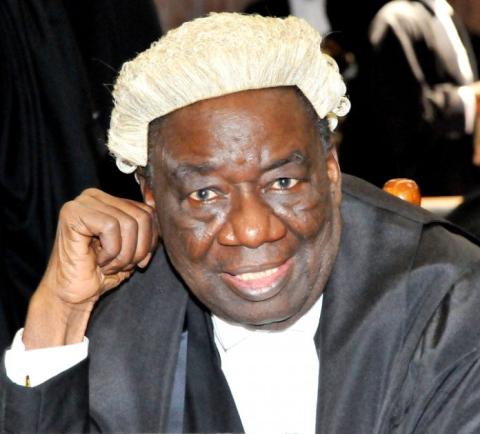
FEDECO announced that NPN polled 5,688,857 votes while its closest rival, the UPN, polled 4,916,657 votes. Even a person hopeless in Mathematics knows which is greater of the two figures, so they had no problem with that. The problem arose when Chief Obafemi Awolowo of the UPN inquired to know if his opponent satisfied the second condition given by the electoral act for a presidential candidate to be declared a winner, which was that candidate must have one-quarter of votes in two-thirds of the states of the federation.

Since Nigeria became independent in 1960, the political space has not been dull. In fact, it’s been a beehive of activity and a continuum of drama. As expected, the cast have been somewhat protean even though the script has remained the same: HOW TO SECURE POWER.
So in 1959, a young man known as Richard Akinjide mounted the political stage to act the role thrust on him by fate. And from the evidence of the duration of his stay on the stage, it’s been more than a walk-on role for him.
Richard Akinjide is popularly referred to as 'Akinjide onisiro', roughly translated as 'Akinjide the mathematician'. But how did the UK–trained lawyer acquire the title of a mathematician? In the spirit of Independence, we take you on a walk down the memory lane and shed light on the event that earned the legal icon the title of a mathematician
HIS LIFE AND POLITICAL CAREER IN BRIEF
Chief Richard Akinjide was born in the early 30s in Ibadan, Nigeria. He was called to the Bar at the Inner Temple in London in 1956. He served as an elected member of parliament, Ibadan, South-East constituency and as a Minister of Education in the Tafawa Balewa Administration from 1959-1966. He was later appointed the Minister of Justice and Attorney General of the Federation by Shehu Shagari. He served in that capacity from 1979-1983 when the civilian administration was toppled by a coup. He is a Senior Advocate of Nigeria.
HOW HE GOT THE MATHEMATICIAN TITLE
In the build-up to the 1979 election, there were five registered political parties. The political parties and their presidential candidates were: Alhaji Shehu Shagari of the National Party of Nigeria (NPN), Chief Obafemi Awolowo of the Unity Party of Nigeria (UPN), Chief Nnamdi Azikwe of National Peoples’ Party (NPP), Alhaji Aminu Kano of Peoples’ Redemption Party (PRP) and Waziri Ibrahim of Great Nigerian Peoples’ Party (GNPP).
The body presiding over electoral processes then was called Federal Electoral Commission of Nigeria (FEDECO) headed by Anthony Ani. Akinjide was the legal adviser of the NPN. The 1979 presidential election was mired in mathematical controversy. FEDECO announced that NPN polled 5,688,857 votes while its closest rival, the UPN, polled 4,916,657 votes.
Even a person hopeless in Mathematics knows which is greater of the two figures, so they had no problem with that. The problem arose when Chief Obafemi Awolowo of the UPN inquired to know if his opponent satisfied the second condition given by the electoral act for a presidential candidate to be declared a winner, which was that candidate must have one-quarter of votes in two-thirds of the states of the federation. Nigeria had 19 states then. Shagari had 25% or one-quarter in 12 states but failed to have 25% in Kano State where he had 243,423 votes — the equivalent of 19.4% of the 1,220,763 votes cast in total in the state. The controversy on how to get the two-third of 19 led to a legal tussle between the two parties and their loyalists.
Chief Obafemi Awolowo took his case to the election tribunal and it ruled against him. Not satisfied with the ruling of the Tribunal, he headed for theSsupreme Court. Awolowo employed the services of Professors Ayodele Awojobi of Mechanical Engineering at the University of Lagos, Chike Obi of Mathematics at the University of Ibadan, J.O.K Ajayi of the Department of History in UI.
These three people were joined by Awolowo himself to form a formidable array of intellectuals with heads for figures and history. Richard Akinjide was the lawyer of Shagari. He rationalised the two-thirds of 19 to be 122/3 and not 13. He came to his rationalisation by dividing the 13th state (Kano) into three and votes cast in two-thirds of the state constituting the figure from where two-thirds of votes were said to have been secured by Shagari, earning Shagari the constitutionally required votes in other words, through fractionalising of Kano State and going for the two-thirds of the votes in the state.
The supreme court eventually upheld the verdict of the election tribunal and ruled in favour of Shagari. But the verdict came with a caveat: THE JUDGEMENT SHOULD NOT BE CITED AS A PRECEDENT IN ANY COURT. The triumph at the court was celebrated in the NPN’s circle and Richard Akinjide, for his fruitful mathematical cum legal manipulation, earned himself the title of a mathematician while the UPN members saw him as a shameless manipulator.
But the name has stuck over the years and virtually everybody calls him “the mathematician” today regardless of the political party they belonged in the Second Republic. Akinjide would later be rewarded with ministerial post; his screening and endorsement on the floor of the house came with a measure of drama too.